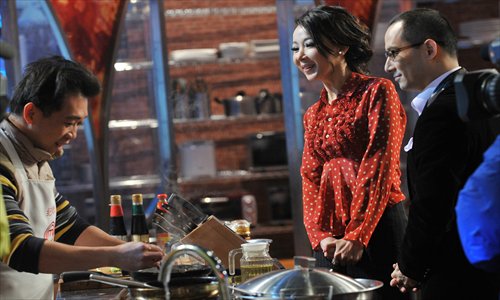Talent TV shows still all the rage
By Xu Wei | 2013-3-11 |
TV talent discovery shows are hot and much better than earlier, trashy star-making contests. But critics say there's not much originality in TV entertainment. Xu Wei reports.
Talent discovery shows such as "The Voice" and "China's Got Talent," based on successful foreign formats, are hugely popular on prime-time television and more talent "reality" shows are planned. Dancing and kung fu are up next.
These are the second-generation of star-making shows - the first were sensationally popular, often tasteless, and generated enthusiasm with live audience SMS votes in prime time. They - along with some often-vulgar dating shows - were ordered to stop or clean up, become more uplifting and end mass voting.
In September 2007, the broadcasting watchdog required the star-making shows to be removed from the prime time from 7:30pm to 10:30pm.
These new talent "discovery" shows are usually aired at 9pm and 10pm on weekends.
Even China Central Television (CCTV) is trying to innovate and enliven its programming, which is largely social and educational, with talent and soft entertainment shows.
On the evening of April 14, CCTV-1 will launch a weekly original dance reality competition, "Dancing My Life." It will run for more than two months.
"As an old brand of China's television, we are now bringing more encouraging and creative programs to the screen," says Qian Wei, director of CCTV-1. "We're eager to cooperate with veteran domestic and foreign producers to make our programs appealing to younger audience."
The show is partly inspired by ABC's "Dancing with the Stars." It will feature a Chinese celebrity and a "grassroots" dancer as a team.
"Sharing their enthusiasm for dance, they will learn from each other and cooperate in an amusing way," says producer Jin Lei. Twelve teams will perform a range of dance styles, including ballroom, Latin, jazz and hip-hop.
"There will also be heartwarming displays of emotional stories behind their dance," Jin says.
Stars on the invite list include Hong Kong singer and actress Cecilia Cheung, mainland TV host Sa Beining and award-winning mainland actress Liu Xiaoqing. In each episode, performances will be judged by a jury panel and a celebrity comedian observer.
Given its large audience base, CCTV's potential for entertainment shows is vast but underestimated, say industry observers. "Dancing My Life" is the first of what is expected to be a number of reality TV shows on weekends.
In September, CCTV-1 is also considering the launch of a martial arts reality competition, "The Kung Fu of China."
Traditional Chinese kung fu from Shaolin Temple, the Wudang Kung Fu Academy and other famed martial arts institutes will showcase their diverse skills, swordsmanship and combat.
Today, most regional satellite television stations air such reality shows, usually with an interesting coaching element, not the slashing bitter comments that have characterized such programs in the past.
"The Voice of China," a reality singing contest based on the copyrighted "Voice of Holland," will launch its second season on Zhejiang Satellite TV over the summer vacation. The first season was a huge hit last year, topping the ratings with an average viewership rating of 4 percent.
According to produce Tian Ming, the show will be developed into a mature and sustainable franchise to support both domestic music and TV industries.
More untapped talents will be discovered in the new season and eight finalists will have opportunities to become contract singers with well-known music companies and release their own albums. Last year, a few top singers got increased exposure and several signed record contracts. None is professional, however, and none have shot to stardom.
Dragon TV airs two popular reality competitions, the Chinese version of "So You Think You Can Dance" (every Sunday night) and the cooking contest "Master Chef" (every Wednesday and Thursday).
In May, the channel will launch "Chinese Idol," a Chinese version of the acclaimed reality singing contest "American Idol." It will compete with Hunan Satellite TV's "China's Strongest Voice," which is based on the format of "The X Factor."
Besides, "China's Got Talent" will also return for a fifth season in November.
"The reality TV genre now plays an important role in the TV industry in terms of its popularity and diversity of styles," says Xu Xiangdong, director of the Chinese version of "So You Think You Can Dance" and "Dancing My Life."
"This fever will last for a long time internationally and also in China because these shows bring out a person's personality and can evoke intense emotions in viewers."
Purchasing successful foreign TV formats is already a trend. The shows share operational know-how and can give Chinese producers new concepts and ideas for a mature franchise and production chain.
"However, only those made with sincerity and real expertise, rather than a short-sighted profit motive, can survive the competition," Xu says.
Chen Peiying (mostly known as Xiao Chen), a celebrated local entertainment TV producer, has witnessed the development of Chinese entertainment shows over 20 years.
Her credits include the popular game show "Intellectual Big Surf," the city's first entertainment TV show that debuted in 1994, and the celebrity dancing reality show "Let's Shake It," which debuted in 2006.
TV audiences today have much shorter attention spans because they have many more choices and change channels quickly if they are not interested.
"A common challenge for domestic TV producers is how to hook an audience in the first five minutes," Chen says. "They naturally feel pressured and begin to resort to reality competition shows that feature a big, shining stage, more spectacular visual effects and magically turn ordinary people into stars overnight."
Chinese entertainment shows have shifted from merely imitating successful foreign shows in the 1990s to the current period of copyright import and localization, she says.
Chinese television needs more than reality shows, since originality and diversity are important for a healthy industry, Chen says.
"Big-budget reality competition series is like a sumptuous meal, but if it is served again and again, people may feel bored and apathetic," she adds. "Small-budget entertainment shows with good creative thinking can also achieve a big success."
She cites the popularity of the light-hearted Dragon TV program "Talk About It," which targets the post-1980s generation.
In each episode, an energetic on-site DJ performance is combined with the young talk show nova Wang Zijian's witty comments on current affairs, cultural events and fashion trends. It's expected to become a long-running show for young people who learn about the world from novel perspectives.
Professor Wu Gang, a TV expert from East China Normal University, says that trying new things is always risky, but being afraid of risk can lead to copycat programs and lack of originality.
"That's why plenty of technical clones stem from China," he says. "Entertainment TV is a good platform for people to use their imagination. It's not a good sign that it is dominated by a single genre (talent), and this may cause aesthetic fatigue."
Even purchasing a successful foreign format cannot guarantee success. Domestic producers still have a lot to learn from foreign shows.
In the West, almost all the successful TV formats have a professional R&D design team working on every detail, such as scenes, positioning, lighting and production, he says. "The judges are very professional. What attracts the audience are the real talent of contestants and judge's astute comments and expertise."
? "So You Think You Can Dance"
Sundays, 9pm, Dragon TV
? "Master Chef"
Wednesdays and Thursdays, 10pm, Dragon TV
? "I Am A Singer"
Fridays 10pm, Hunan Satellite TV
? "Dancing My Life"
From April 14, 8pm, CCTV-1






 Reply With Quote
Reply With Quote